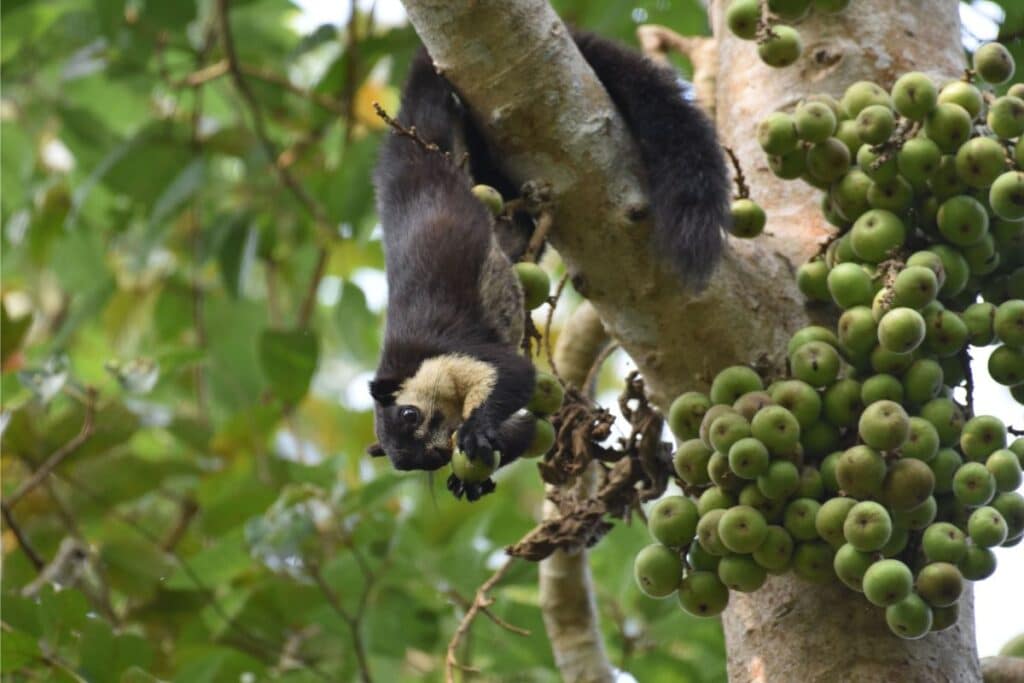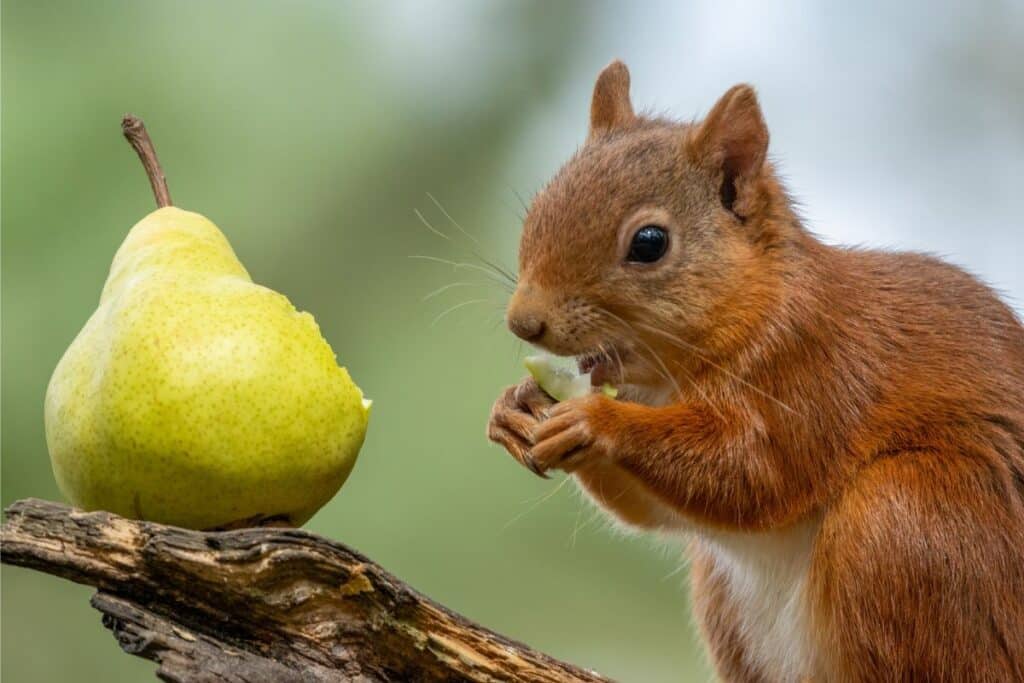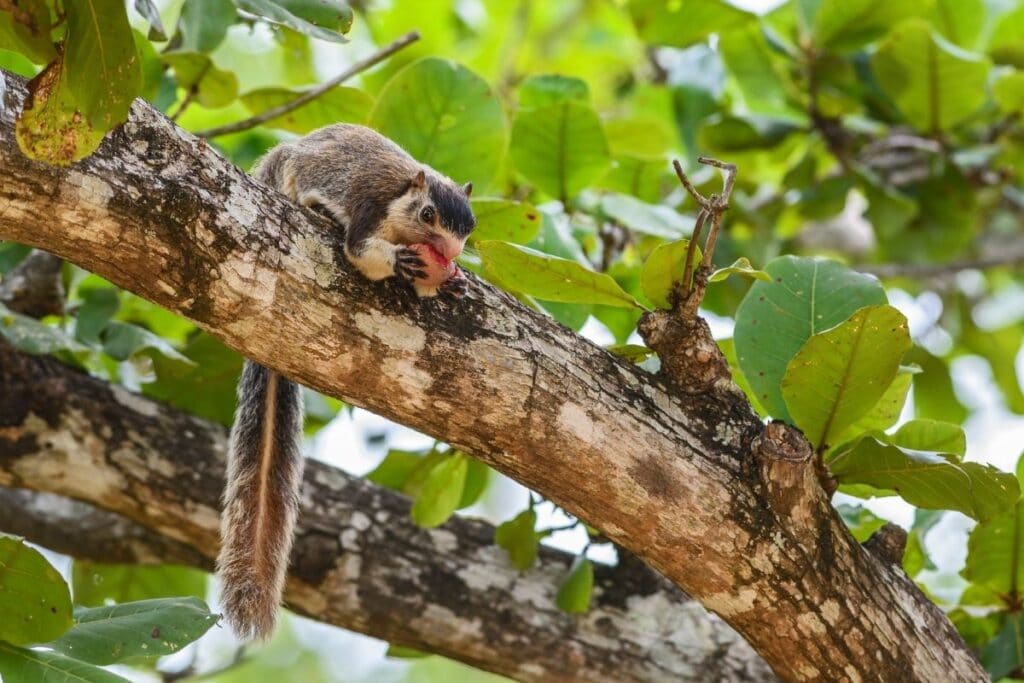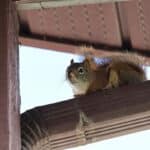If you’re like most people, you enjoy having a few fruit trees in your backyard. Not only do they provide shade and privacy, but they also produce delicious fruit for snacking on.
However, if you’re not careful, squirrels can quickly take over your fruit trees and steal all the good food. Here are a few tips on how to keep squirrels out of fruit trees.
Growing and harvesting fresh fruit from the garden is one of the most rewarding parts of gardening. That is why it is heartbreaking to realize that squirrels have ruined the fruits of your labor (literally speaking) before you can enjoy them yourself.
So if you have pesky squirrels helping themselves to your fruit trees, don’t lose hope and keep reading. Below we’ll provide some helpful tips for keeping squirrels out of your fruit trees.

Which Fruit Trees Attract Squirrels?
Squirrels are attracted to our fruit trees for many reasons. In particular, however, they love the delicious flavors just like we do! Unfortunately, squirrels like to eat almost every type of fruit, with some varieties being more popular than others.
Here are many fruits that squirrels will eat, including but not limited to:
- Peaches
- Apples
- Figs
- Oranges and other citrus fruits
- Plums
- Nectarines
- Mandarin
- Pears
- Persimmons
- Cherries
- Apricots
- Avocados
- Berries such as strawberries
However, just because you grow one of the above fruits does not mean that your entire harvest will be ruined. You can take measures to protect your fruit trees from squirrels, chipmunks and other animals like birds.

How Do I Protect My Fruit Trees from Squirrels?
Protecting your fruit trees from pesky critters can be a daunting task, but it’s important to take the necessary precautions to ensure that your crop remains safe and intact.
#1. Apply Repellent
Creating a potent repellent and consistently applying the solution is one of the most effective ways to protect your fruit trees from squirrels. However, it is essential to note that if you choose to make your repellent with chili peppers, the capsaicin in the peppers may only fend off the squirrels and not the birds.
Reapplying squirrel repellent after rainfall and watering is crucial to maintaining an intense aroma. We also recommend giving up your repellent recipe in order to not let the birds and squirrels get accustomed.
#2. Protect Your Trees with Wildlife Netting
Wildlife netting, also known as bird netting, is a mesh material that you can drape over and wrap around your fruit trees. To avoid potentially injuring and unintentionally trapping wildlife, you need to make sure the plastic bird netting is taut and well secured.
It should be noted that while bird netting is effective with birds, it may not discourage squirrels. We have seen squirrels chew and scratch through the bird netting mesh to access the fruits.
#3. Install Baffles on Your Trees
Baffles are protective barriers or cone-shaped collars that wrap around the base of your fruit trees. Baffles prevent squirrels from climbing up the trunk to access the fruits. Baffles are easy to find at your local nursery or garden center.
This might consist of a metal tube or even metal collars that are meant to repel squirrels and prevent them from climbing up on the tree. Often, you can cover these with petroleum jelly for an added boost of efficacy!
You may also want to consider making your baffle. Thin pieces of sheet metal or flexible plastic can be purchased at any hardware store. Cut the material to size, and wrap it around the tree so that the bottom flares outward. Then, you can secure the baffle to the trunk with wire strung through holes in the baffle.
#4. Put Fruit Bags on the Trees
If squirrels are absolutely decimating your fruit crop, you may need more than one method to protect the fruit. Putting fruit bags over a ripening crop is a good option to prevent squirrels from nibbling on the fruit.
#5. Place Decoy Predators Around Your Garden
You can scare squirrels away if you position decoy predators around your fruit trees. Plastic owls, hawks, scarecrows, and fake snakes are effective fake predators. If you do want to try this method, make sure periodically reposition the predators to keep the squirrels from growing accustomed to them.
#6. Hit Them With a Spray Bottle
In the next section, we’ll give you some ideas of squirrel repellent that you can put into a spray bottle (such as a hot pepper spray) to keep squirrels away.
But it’s also important to mention that even something as simple as water in a spray bottle can help deter squirrels. Of course, you have to be there for it to matter – you’ll spray the squirrels with water when you notice them sprinting up the tree trunk.
It can work in a pinch, though, and it’s a good option if you only see a squirrel every now and then.
#7. Consult a Pro
If the problem gets especially bad and you’ve completely run out of options, then you might consider consulting a professional. Pest control experts will be able to assess your problem and offer guidance. Often, professionals will humanely bait, trap, and relocate the squirrels.
What’s a Good Squirrel Repellent?
Effective squirrel repellents employ intense aromas to create an invisible odor barrier that keeps squirrels out of certain areas and away from specific plants.
There are plenty of squirrel repellents you can purchase from your local garden center or hardware store. However, we prefer to make our repellents with household ingredients.
Simple and effective squirrel repellents can be made with ingredients you already have around the home. Vinegar, garlic, and scented dish soap are all good options, but we prefer using hot chili peppers, for example, cayenne pepper, hot sauce or hot pepper oil.
Simply mix the cayenne pepper with water in a spray bottle and spray it around the fruit trees you want to defend. Remember to reapply after watering and rainfall to help control and get rid of squirrels.
How Do I Keep Squirrels from Eating My Peaches and Other Fruits?
We think fresh peaches are delicious! Unfortunately, squirrels do too.
And if they get the opportunity, squirrels will ravage the edible fruits well before you are able to harvest. The good news is there are various tactics you can utilize to protect your peach trees.
- Spray your homemade squirrel repellent such as hot pepper squirrels spray liberally and consistently.
- Scare the squirrels away from the trees with decoy predators, reflective objects, and decoration that makes noise and moves such as garden spinners.
- Only include squirrel-resistant fruit trees in your garden.
With a bit of effort, it is possible to deter squirrels out of fruit trees and to prevent them from destroying the entire tree.
What Are Some Squirrel Resistant Fruit Trees You Can Grow?
Growing a fruit tree such as an apple tree in the garden is enjoyable. However, it’s not as fun when the neighborhood squirrels ruin all the fruit. So if you want to plant a new fruit tree in your garden, we recommend growing a squirrel-resistant variety.
While you may not have more luck growing one fruit tree over another, the fact of the matter is that there are some “squirrel-resistant fruits.” These don’t necessarily repel squirrels, but they are simply less likely to serve as an all-you-can-eat buffet squirrel feeder!
Squirrel-resistant fruits are ones that squirrels typically do not enjoy. Sometimes squirrels find the flavor of certain fruits to be undesirable. Squirrels also don’t like fruits that are too challenging to eat due to their rough exterior. Therefore, an apple tree is probably not the best choice for squirrel-resistant plants.
After doing some research and pulling from our own gardening experience, we have found the following fruit trees that squirrels don’t like:
- Pomegranates
- Limes
- Kumquats
- Lemons
However, keep in mind that every now and then you might still see animals on your trees due to curiosity or scarcity of food sources.
How Do You Squirrel Proof a Tree?
Completely squirrel-proofing a tree can be a time-consuming undertaking. You will need to experiment to find which methods work the best for your garden. Yet it is possible!
Typically, you will find the most success when you utilize multiple tactics at once. For example, we install baffles on every trunk to protect our fruit trees, routinely spray squirrel repellents, and protect our trees with wildlife netting if the problem is terrible. We also provide an alternative food source so the squirrels aren’t as enticed to eat the fruit from the fruit trees.
Here are specific ways on how to prevent squirrels from climbing a tree:
- Install Tree Wraps: Use metal or plastic wraps around the trunk of the tree. Make sure it’s about 5-6 feet high from the ground to prevent squirrels from jumping over it.
- Use Squirrel Guards: Install cone or baffle-type squirrel guards on the trunks of trees. They prevent squirrels from climbing past them.
- Apply Repellents: Use commercially available squirrel repellents on the tree trunks, which deter squirrels from climbing.
- Install a Physical Barrier: Use a slick material like sheet metal to wrap around the tree trunk. This makes it hard for squirrels to grip.
- Prune Branches: Keep tree branches trimmed at least 8 feet away from buildings or other structures to prevent squirrels from jumping onto the trees.
- Maintain Yard Cleanliness: Regularly clean the yard to eliminate potential food sources, which will make the area less attractive to squirrels.
- Consider Netting: If the tree is small or you’re specifically protecting fruit trees, you can use netting to keep squirrels away.
- Use Scare Tactics: Devices like motion-activated sprinklers, ultrasonic repellers, or fake predators can deter squirrels.
- Train a Pet: A dog or cat can discourage squirrels from coming into the yard.
- Seek Professional Help: If the problem persists, consider consulting with a pest management professional.
You can try something similar to regain control over your precious fruits. Good luck!
See more ways to keep squirrels away from garden and plants that squirrels hate.
Up next:
- How to keep squirrels out of flower pots
- How to keep squirrels away from bird feeders
- How do you keep squirrels from eating your pumpkins
*image by SarahLouPhotography&wirestock_creators&DHDeposit18/depositphotos







